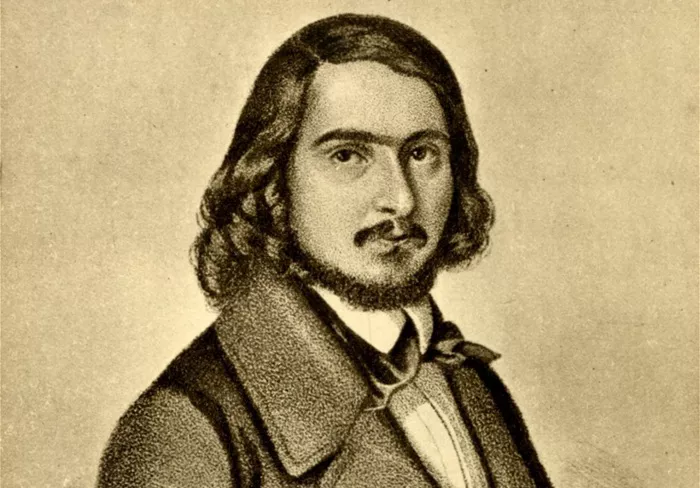Georg Herwegh was a prominent 19th Century German poet whose works embodied the spirit of political revolution and social change. Born in 1817, he became one of the leading figures in the Vormärz movement, a period of political unrest in the German Confederation leading up to the Revolutions of 1848. His poetry, characterized by passionate calls for freedom and unity, played a crucial role in shaping German literature and inspiring political activism. Herwegh’s influence extended beyond Germany, positioning him alongside other revolutionary poets of the time, such as Heinrich Heine and Ferdinand Freiligrath. This article explores Herwegh’s literary contributions, compares him with his contemporaries, and examines his lasting impact on German poetry.
Early Life and Literary Beginnings
Georg Herwegh was born on May 31, 1817, in Stuttgart, in what was then the Kingdom of Württemberg. He initially studied theology but later shifted his focus to law. However, his growing dissatisfaction with the political environment led him to abandon his studies and dedicate himself entirely to literature.
In the early 1840s, Herwegh gained recognition with his poetry collection Gedichte eines Lebendigen (Poems of a Living Man). The collection was a direct challenge to the political order, and its revolutionary tone resonated with a generation eager for change. It was widely circulated and became one of the most influential poetry collections in 19th Century German poetry.
Political Engagement and Exile
Herwegh’s poetry was not merely literary; it was deeply political. His commitment to the revolutionary cause made him a target of state authorities. After a conflict with the police in Württemberg, he fled to Switzerland, where he found refuge among other exiled revolutionaries. During his exile, he continued to write poetry advocating for democracy, justice, and the unification of Germany.
His association with Karl Marx and Friedrich Engels further solidified his position as a poet of the working-class struggle. He was an active supporter of the German Democratic Legion, a revolutionary group that sought to overthrow the monarchy. In 1848, Herwegh returned to Germany, hoping to participate in the revolution. However, his attempts to rally a revolutionary force failed, and he was forced into exile once again.
Literary Style and Themes
Herwegh’s poetry is marked by a unique blend of romantic idealism and political urgency. Unlike some of his contemporaries who focused on personal and introspective themes, Herwegh’s work was outward-looking, addressing issues of oppression, freedom, and social justice.
Revolution and Freedom: Many of Herwegh’s poems call for political upheaval and resistance against tyranny. His famous line, “Das Wort sie sollen lassen stahn” (Let them leave the word standing), became a rallying cry for revolutionaries.
Unity and Nationalism: Herwegh strongly believed in a unified Germany, free from the rule of conservative monarchies. His poetry often reflects a longing for national cohesion and democratic governance.
Critique of Authority: He was unafraid to criticize rulers and institutions, which made him a controversial figure. His work was often censored, but it remained influential among those who sought change.
Comparison with Contemporary Poets
Herwegh’s poetry shares similarities with other 19th Century German poets who wrote about politics and social issues. Comparing his work with that of Heinrich Heine and Ferdinand Freiligrath provides valuable insights into the landscape of German poetry at the time.
Heinrich Heine: Like Herwegh, Heine was a poet of exile and political resistance. However, Heine’s poetry was often more satirical and philosophical, whereas Herwegh’s was direct and militant.
Ferdinand Freiligrath: Freiligrath was another poet associated with the revolutionary movement. His work was more lyrical and emotional, but he shared Herwegh’s commitment to political activism.
Georg Büchner: Although primarily a playwright, Büchner’s prose and poetry also carried revolutionary themes. Herwegh and Büchner both wrote about the struggles of the oppressed and the need for radical change.
Impact and Legacy
Despite his political failures, Herwegh’s contributions to German poetry remain significant. His works continued to inspire later generations of poets and political activists. During the Weimar Republic and the post-World War II era, scholars revisited his poetry as an example of literary resistance.
Herwegh’s influence extends beyond literature into the realm of political thought. His poetry embodies the idea that art can serve as a tool for change, a concept that later poets and writers would embrace in different historical contexts. While his name may not be as widely recognized as Heine’s or Goethe‘s, his role as a revolutionary poet cements his place in the canon of 19th Century German poetry.
Conclusion
Georg Herwegh was more than a poet; he was a voice for political change in 19th Century German poetry. His verses carried the hopes and frustrations of a generation fighting for democracy and national unity. Although he faced exile and political defeat, his poetry endures as a testament to the power of words in shaping history. By comparing his work with that of his contemporaries, it becomes evident that Herwegh was a key figure in the literary and political movements of his time. His legacy remains relevant today, reminding us of the enduring connection between literature and social change.

